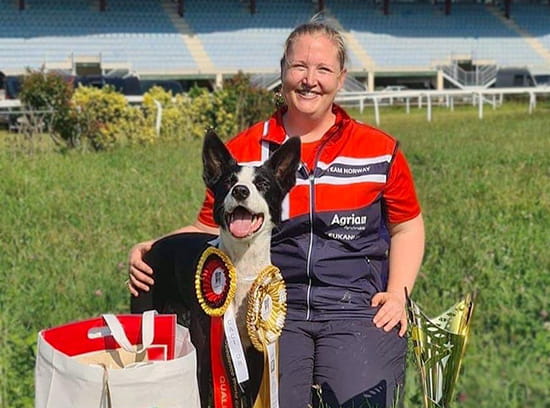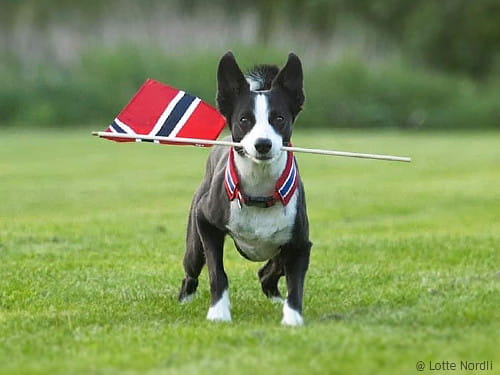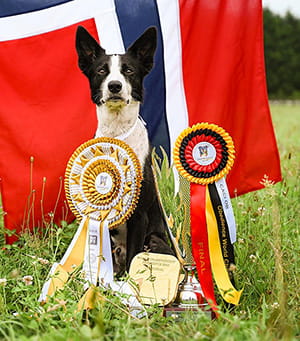If there is a team that knows how to deliver, then it is none other than Lotte Nordli and her Border Collie Bondi from Norway, winners of the Obedience World Championships 2023. After her captivating performance, I asked her for an interview - and luckily, she said yes!
Just tell me about Bondi and you! How old are you? What is your profession?
So, I am 36 years old, and I’m a registered nurse and dog fan for life! My first competition was in 2009, with my Tervueren, Cirka. I thought it went splendidly – only to realize that we barely made first prize. This moment was the beginning of my everlasting search for the perfect image of what obedience exercises should look like.
 When did you realize what potential Bondi had?
When did you realize what potential Bondi had?
In 2019 I bought this adoring little pup from Lisa Hansson. From day one he got under my skin and has always had this amazing will to collaborate and interact with genuine joy. What should WE do? When someone asks you that and follows up by eagerly agreeing with whatever you say, all day long, it really does something for one’s relationship. We. Us. Together. One. That is perhaps what I find most magical about Bondi. He is a very alert dog. Sometimes I cannot figure out how he knows things – he reads me like an open book.
I‘ve always believed that Bondi will be World Champion one day. I am confident in my own competence, and this dog never showed me anything but quality. It has been the goal all along. I didn’t know it would happen – there is an aspect of coincidence and luck with this – and certainly not so soon, but it not being possible was never even an option. In my training journal, my goal for WCO was to not care about points as we went, to handle the dog with calmness and control, (“quiet concentration” and “calm power”) and (for me) to try to have some form of fun, or at least feel gratitude for being allowed to compete at such an event with all these amazing handlers. I really don’t celebrate competing much. I think I managed all three, and I’m looking forward to checking off goals achieved for June!
My training philosophy is based in science. I have studied learning theory for several years. I also really value the dog‘s freedom. Back in the days people would tell you to let the pup be a pup, leave it be, don’t train too early – I never do anything but let the dog be a dog, motivating my dog to choose, and I see my job as guiding those choices closer and closer to my goals. There should always be room for the dog, its opinions and personality in our team and our work. And of course, the PAY. If you do a job, you get paid. And so do my dogs.
How often do you train?
I train a lot. I prefer to train every day, and I have long sessions too. The way to get really good at something is to do it many, many times. So I need a training system that will make the dog want to do this a lot of times every day, to really love what we do – but without only working in formula 1 speed. Because that’s what they eventually tend to do, when everything is just fun and rewards. And so we normally add some pressure to calm things down. And then it‘s not so much fun anymore, and we cannot do it too often. This is a trap that I didn’t want to fall into. I want to be able to tell my dog that something is wrong, without the dog giving up or getting sad, but the dog being able to regulate stress and to try to figure out the solution instead.
What is the most important thing for you in training?
What is the most important thing in my training – I don’t know. I would say communication, perhaps. In my system nothing is by chance. I cannot take out a single part; everything is a part of the total concept. I don’t have a motto either. You just have to put in the hours – even if you’re tired, even if it‘s raining, even if you’d prefer to go to a gala dinner instead. I am still a bit sad that I missed the main course at the gala, to go train my dog in the headlights of the car until midnight. Definitely getting a fancy dinner with my teammate Beth, who also skipped dinner to help me. Love her for that (too)!
The point of this was not to train for details in the program, but to get the worst craziness out of my dog. Only to be back at the training area at 6 am, to train some more, before entering the ring as starter number 1. It might have been a bit too much – I played it safe, but knowing what I know now, I could have done a little less and maybe relaxed a bit more.
How did your qualifiers go?
The competitions for WCO went well. We had most ranking points in the end. This got us off to WCO in Oviedo – where we both managed to do our jobs for the most parts.
What is most important to you when you observe a human-dog team? What is your motto, if you have one?
The most important thing for me when I see a team has to be how they communicate. There are so many ways. Communication is a strength. I believe that it accelerates the learning process when you talk with each other.
Dogs are smart – if we have faith in the process and aren’t afraid of making mistakes, we can make the very most of that. When we fear mistakes, we tend to help them out too much and we create little copycats: „Just do what you did last time. Don’t think.“ That gets us in trouble when things get difficult. Instead, make the dogs truly understand their task and let them experience what variations in that task do not pay off.
Do I want to do a lot of recall without stops, so that the ones with stops are good? Or do I teach the dog that stopping by itself, changing speed and anticipating does not pay off, and that the only way to master the exercise is to run in an even pace all the time, no matter how many stops?
This is one of my fundamental principles. I want the dog to understand exactly what to do, and what not to do. Otherwise I will spend 80-90 percent of my training working on secondary issues and not the actual exercises, trying to convince the dog that it’s not going to stop when indeed it is going to stop. That’s a waste of time and effort in my mind. It is a job that never ends. It takes some time to get there, yes, but once you’re there and the dog has truly understood the exercises, competitions actually make you better and don’t just show you what all needs to be fixed before you enter the next one.
Thank you so much and much success in your future!
Fotos: @Lotte Nordli









